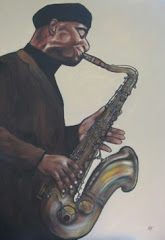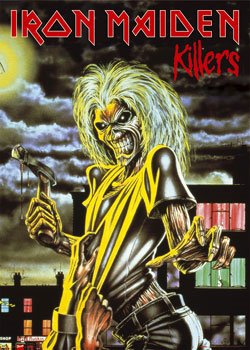 Danzig is an American heavy metal band that fuses dark lyrics and imagery with blues-rock influences. The band serves as a musical outlet for singer/composer Glenn Danzig. The band can be seen as the third stage in Glenn Danzig's musical career, preceded by the horror punk bands Misfits and Samhain.
Danzig is an American heavy metal band that fuses dark lyrics and imagery with blues-rock influences. The band serves as a musical outlet for singer/composer Glenn Danzig. The band can be seen as the third stage in Glenn Danzig's musical career, preceded by the horror punk bands Misfits and Samhain.HISTORY :
1986-1987
On July 14, 1986, Samhain performed what was to be their final show, at The Ritz in New York City. In attendance was Rick Rubin, who was scouting for potential bands to sign to his record label, Def Jam.
Upon viewing Samhain's performance, Rubin was impressed with Glenn Danzig's powerful stage persona and vocal abilities. He approached him after the show and propositioned him. At first, he wished only to sign Danzig, with the intent of making him the vocalist for a hard rock supergroup that Rubin envisioned. However, Danzig refused to sign to Rubin's label without Samhain's bassist, Eerie Von, with whom Danzig had become great friends. Rubin agreed to sign Samhain, and he began making suggestions for the new direction he felt the band should take. Rubin felt the music should be stripped down, and that Danzig's vocal talents should become the focal point for the band.
1987-1994
Having formed and begun recording as Danzig the previous year, in 1988 the band released its eponymous first album on Rick Rubin's newly formed label Def American (later renamed to American Recordings). The album featured polished production by Rubin, with heavy, blues-based guitar riffs and Danzig's powerful and melodic vocal performance -- a harsh contrast to the gritty, raw-sounding production of Samhain's albums.
In 1990, Danzig released their second album, Danzig II: Lucifuge, the band's most diverse LP. Here the music continued to blur the lines between classic blues and hard rock.
By 1992, Rubin's involvement with the band had waned and Danzig himself took credit for co-producing the third album, Danzig III: How the Gods Kill. The following year the band released the Thrall: Demonsweatlive EP, which contained several live tracks from the band's 1992 Halloween show, as well as three new studio tracks. The EP provided a hit for the band when the live version of "Mother" (a song from the first Danzig album) became popular on hard rock radio stations. A new version of the "Mother" music video was created using live footage, and the video became a hit on MTV as well, pushing Danzig into the mainstream.
With Danzig in the spotlight, controversy surrounding the nature of Glenn Danzig's lyrics and imagery increased. Conservative Christian groups accused Danzig of being a Satanist; Danzig dismissed their characterization in his official response through his publicist: "We welcome their disdain". Danzig has repeatedly denied accusations of being a Satanist, saying that while he is spiritual, he rejects all religions, especially organized religion, but is fascinated by the nature of evil and merely finds Satan to be an interesting figure in Christian theology.[citation needed]
In October 1993, the band entered the studio to record their fourth studio album. Danzig says that he was pressured by executives at his record label to record songs with the commercial appeal of "another 'Mother'", but that he was determined not to backtrack in his musical progression. He also says that Rick Rubin had become increasingly distant from the band and had little involvement in the recording of the fourth album, which Glenn Danzig alone is credited as having produced. On October 4, 1994 Danzig 4 was released, a more atmospheric and experimental album than the band's previous releases, reintroducing elements of production that Danzig had not much used since the Samhain era.
While the album sold well, it did not contain a hit on par with the "Mother" single. The album's second single, "Cantspeak", was also a staple in MTV's rotation (even making the Buzz Bin), and it charted on the rock charts, although (unlike "Mother") it failed to appear on the Hot 100. "Cantspeak" is the band's only single other than "Mother" to chart on Billboard, thus making the band a two-hit wonder of the mainstream scene. Amid accusations of unpaid royalties and broken promises, Danzig's relationship with Rubin deteriorated, and the band left the record label.
Around this time, the band's lineup began to dissolve as well. First, Chuck Biscuits left the band in the summer of 1994 due to royalty disagreements. After he was rejected upon asking to return, he was replaced by Joey Castillo, who made his first public appearance as a member of Danzig at an in-store signing the day of the fourth album's release. Though the band had toured successfully with its new drummer during the fall and winter of 1994-95, by the spring of 1995 Danzig was actively seeking a new guitarist. John Christ learned of this, and, never content with his role and relative lack of input in the band, resigned his position on 5 July 1995, all offices having been closed the previous day for the Independence Day holiday. Coincidentally, Eerie Von resigned the very same day, ending what is often called the "classic era" of the band. Glenn Danzig has since contended that it was always his intention to have a revolving line-up, but it just so happened that the original lineup worked well and remained intact for much longer than he had expected. Since the end of the classic era, each Danzig album has featured a different band lineup.
1995-1999
In 1996, Danzig 5: Blackacidevil was released, surprising many with its heavy emphasis on industrial rock. Danzig has stated that Rick Rubin had been keeping him from experimenting with electronics on earlier Danzig releases, and so with the fifth album, he was eager to indulge in industrial sounds unimpeded. The album was mostly a solo effort by Danzig, although Jerry Cantrell of Alice in Chains played lead guitar on three of the album's tracks, and drum duties were handled by Joey Castillo, the sole member still in the band from the 4P Tour (Joey would go on to record on two more Danzig albums, making him the longest-standing member outside of the original lineup). In online polls the album is often listed as fans' least favorite by Danzig, presumably due to the drastic departure from the sound of the first four releases. Additionally, while Danzig's vocals had always been a highlight of the band, on most songs on Blackacidevil his voice is heavily distorted or buried under layers of effects. Other fans embraced the album, and saw it as Danzig returning to the more experimental style of Samhain.
The next couple years saw Danzig tied up in a legal battle with Rick Rubin over the rights to the unreleased material the band produced under American Recordings. After winning back the rights, Danzig entered the studio to record the sixth full-length album. In November 1999, Danzig 6:66 Satan's Child was released, with mixed reactions from fans and critics. It featured dark and heavy hard rock accented by mild electronics, with Danzig singing in an uncharacteristic, harsh, whispery tone on many songs. Some critics and fans have described the sound of the album as being similar to nu metal, a genre of heavy music that Danzig is well known to detest. This comparison is often attributed to its production by Jay Gordon and Amir Derakh of the electropop/nu metal band, Orgy.
Since 2000
By 2000, Danzig's line up had stabilized with the addition of guitarist Todd Youth and bassist Howie Pyro, both veterans of the New York City punk scene. In 2002, this line up released the album Danzig 777: I Luciferi. The album was devoid of electronics and contained some of the darkest and heaviest songs of Danzig's career. Some of the later tracks on I Luciferi hearkened back to the classic sound of the band, and many fans heralded it as a return to form, although some were disappointed with the album's production quality.
In 2004, Danzig released their eighth studio album, Circle of Snakes, which, along with the previous album, many fans view as the singer's best work since the classic era of the band. On Circle of Snakes the line up was again re-written and now featured Tommy Victor of Prong on guitar; Victor had toured as a member of Danzig years earlier, but had never before recorded an album with the band. The sound evolved again, and here Tommy Victor’s guitar seemed to be the dominant force on each song, to the point that some critics felt the drums and vocals had become buried under the weight of multiple guitar tracks.
Soon after the album's release, Danzig then set out headlining the Blackest of the Black tour across the United States, replacing Circle of Snakes drummer Bevan Davies with Johnny Kelly (of Type O Negative). "The Blackest of the Black" was meant to be a yearly package set up by Glenn Danzig as a way to help some of his favorite dark underground bands gain more exposure, while providing fans of heavy music an alternative to Ozzfest, which Danzig felt had become over saturated with commercialized nu metal acts. During the 2005 Blackest of the Black dates, halfway through the Danzig set, the band was joined by Doyle, the Misfits most celebrated guitarist, for a set of classic Misfits songs. These shows were the first time Danzig had played with Doyle in over twenty years, and many of these shows were sold out.
Throughout 2006, Glenn Danzig stated in several interviews that he had grown tired of the touring cycle, and did not expect to partake in any more large scale tours. Instead, Danzig would go on small, localized tours, such as the ten west coast dates they played for the 2006 Blackest of the Black tour. This tour debuted Kenny Hickey (of Type O Negative) as the band's new guitarists, while the East Coast dates saw the addition of former Samhain member, Steve Zing on bass. Danzig said he would use his downtime from touring to complete his various unfinished projects, and focus more attention on his other interests, such as writing and directing films.
In October of 2006, he released Black Aria II, the follow-up to his solo classical album, Black Aria. He spent the rest of the year completing the production and packaging of The Lost Tracks of Danzig, a double CD containing twenty-six unreleased songs that span the entire Danzig catalog, which was released on July 10, 2007. Danzig has also stated that he plans to record a dark blues album with either Jerry Cantrell or Hank Williams III. In May 2007, Evilive re-released Danzig's original classical effort Black Aria.
Current members :
Glenn Danzig – lead vocals, rhythm guitar, keyboards (1987–present) Robert Benkovic – lead guitar (2000–2002, 2007–present) Steve Zing – bass guitar, backing vocals (2006–present) Johnny Kelly – drums, percussion (2002–2003, 2005–present)
Former members :
John Christ – guitar (1987–1995) Tom Orio-Nist – guitar (1996) Dave Kushner – guitar (1997) Tommy Victor – guitar (1997–1998, 2002–2005) Jeff Chambers – guitar (1998–1999) Todd Youth - guitar (1999-2002) Joe Fraulob – guitar (2005–2006) Kenny Hickey – guitar (2006–2007) Cody nuckols - guitar (2007-present) Doyle Wolfgang Von Frankenstein – guest live guitar (2006) Eerie Von – bass (1987–1995) Josh Lazie – bass guitar (1996–1997, 1998–2000) Rob Nicholson – bass guitar (1997–1998) Howie Pyro – bass (2000–2002) Jerry Montano – bass guitar (2002–2006) Chuck Biscuits – drums, percussion (1987–1994) Joey Castillo – drums, percussion (1994–2002) Charlee Johnson – drums, percussion (2002) Bevan Davies – drums, percussion (2004–2005) Karl Rosqvist - drums, percussion (2007)
1988 Danzig
1990 Lucifuge
1992 How the Gods Kill
1994 4
1996 Blackacidevil
1999 Satan's Child
2002 I Luciferi
2004 Circle of Snakes
























































Žádné komentáře:
Okomentovat